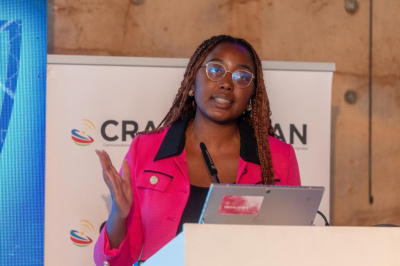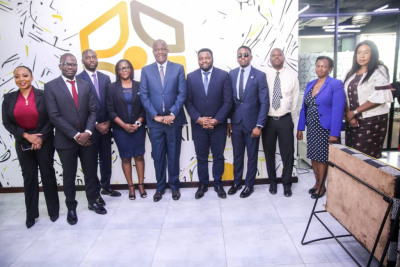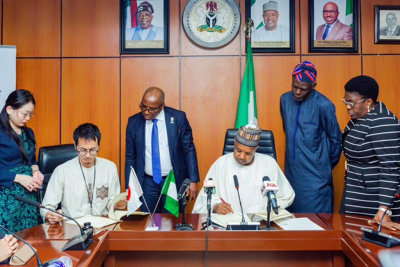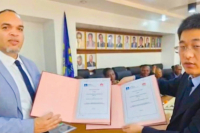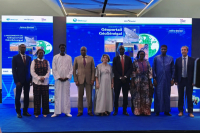
Tech (823)
At GITEX Africa 2025 in Marrakesh, Morocco's Minister of Health and Social Protection, Amine Tehraoui, announced the launch of GITEX Future Health Africa/Morocco. This event aims to accelerate the digitization of Africa's healthcare industry.
Scheduled for April 21–23, 2026, in Casablanca, it will feature GITEX DIGI_HEALTH, focusing on leveraging AI and digital technologies to address challenges in healthcare information, delivery, access, and efficiency.
The three-day event will include a leadership summit targeting decision-makers from hospitals, healthcare institutions, and government bodies, focusing on themes such as health infrastructure, expanded access to healthcare, investment, data security, and AI-powered diagnostics.
Morocco has been actively digitizing its documentary heritage in recent years. This project is expected to gain significant momentum in the coming months, with the aim of preserving national archives and improving access for everyone.
Morocco's Ministry of Digital Transition and Administrative Reform, the Ministry of Economy and Finance, the Ministry of Youth, Culture and Communication, and the National Library of Morocco signed a partnership agreement on Wednesday, aiming to digitize the library's extensive documentary collection. The agreement was finalized on the sidelines of the third edition of the Gitex Africa technology fair held in Marrakech.
The agreement outlines the digitization of ancient manuscripts, periodicals, and donated collections housed within the National Library. The institution currently holds a significant documentary heritage, encompassing approximately 700,000 books and artworks, along with over 100,000 manuscripts. The partnership also includes an overhaul of the library's institutional portal, the implementation of legal deposit for digital publications, and the integration of the Amazigh language into the digital services offered. Furthermore, a specialized software program for individuals with special needs will be developed.
This initiative is a key component of Morocco's Digital 2030 strategy, which seeks to accelerate the country's digital transformation, notably through the modernization of public services. As the custodian of the nation's written heritage and a center of cultural influence, the National Library plays a pivotal role in this strategy. The project also aligns with the vision of King Mohammed VI, who champions the use of digital technology as a catalyst for human development, knowledge dissemination, and social inclusion. It complements ongoing digitization efforts within the administration, justice system, education sector, and healthcare.
Beyond its technical aspects, the project pursues several objectives: to ensure the long-term preservation of the kingdom’s literary and historical works, safeguarding them against deterioration or loss; to expand access to documentary resources for all citizens, including those in remote regions; and to equip researchers with modern consultation tools. Additionally, the project aims to enhance the international visibility of Morocco’s cultural heritage by making its documentary treasures accessible online, fostering knowledge sharing and transmission on a global scale.
Samira Njoya
As cyber threats become increasingly sophisticated, the establishment of NAM-CSIRT ensures that Namibia is better equipped to detect, analyze, and respond to cyber incidents promptly.
The Communications Regulatory Authority of Namibia (CRAN) launched, on April 15, the Namibia Cyber Security Incident Response Team (NAM-CSIRT) to strengthen the nation's digital security. Funded by a N$20 million seed investment from the Ministry of Information and Communication Technology (MICT), this initiative underscores the government's commitment to safeguarding critical digital infrastructure.
Minister of Information and Communication Technology, Emma Theofelus, emphasized that the allocated funds will equip NAM-CSIRT with essential tools, technology, and personnel to effectively and efficiently address cyber threats. This strategic investment is designed to enhance the team's capacity to respond to and mitigate cyber incidents, thereby reinforcing Namibia's cybersecurity posture.
NAM-CSIRT is established to serve as the nation's central authority for managing cyber threats and incidents. Its primary objective is to enhance the security and stability of Namibia's critical infrastructure and information systems across government institutions, agencies, and other key sectors.
As of December 31, 2024, Namibia recorded over 1.2 million cyber events and more than 2.7 million cyber vulnerabilities, with seven major incidents managed during that period, according to NAM-CSIRT. Notably, in December 2024, Telecom Namibia suffered a significant cyberattack, resulting in the exfiltration of approximately 626.3GB of data by the attackers who later leaked some portions of sensitive data on social media.
NAM-CSIRT is expected to serve as Namibia's frontline defense against cyber threats, ensuring swift and effective responses to cyber incidents. The team will operate under a governance framework that upholds the highest standards of integrity and accountability.
Hikmatu Bilali
Zambia, like many African countries, faces the challenge of brain drain, with skilled tech professionals leaving for better opportunities abroad. The survey will address this by informing policies that could retain local talent, foster better job opportunities, and create an environment conducive to innovation.
Zambia has launched the State of the Developer Ecosystem in Zambia Survey 2025, a collaborative effort between the ICT Association of Zambia (ICTAZ) and BongoHive, a technology and innovation hub. The survey, announced on April 11, aims to guide Zambia’s digital transformation, with insights on the needs, challenges, and goals of the developer community.
At the launch, Minister of Technology and Science, Hon. Felix Mutati, commended BongoHive and ICTAZ for their foresight and leadership in launching the state of the developer Ecosystem in Zambia Survey 2025.
The survey will address several key areas. First, it will focus on skills development, ensuring that developers have continuous access to learning and training in emerging fields like AI, blockchain, and cybersecurity. It will also tackle employment and opportunities to retain talent and reverse brain drain through targeted policies. Entrepreneurship and innovation will be prioritized, with a focus on providing tech start-ups with capital, mentorship, and supportive policies. The survey will also examine overcoming barriers, emphasizing the importance of improving innovation quality to attract funding and support. Lastly, it will explore the strategic pillars of skills development and entrepreneurship to further boost digital growth.
According to the Ministry of Technology and Science, the ICT sector grew 17.8% in 2024, contributing 3.5% to GDP. This growth demonstrates that digital technology is increasingly becoming a key driver of economic progress. By focusing on the developer ecosystem, the government aims to sustain this momentum and ensure the sector is equipped to meet future challenges. As technology continues to disrupt industries, from agriculture to finance, the demand for skilled developers is more critical than ever to fuel the digital economy.
Hikmatu Bilali
- Mauritius plans mandatory registration for online vendors to improve e-commerce regulation
- Proposed registry will require sellers to obtain licenses and meet compliance standards
- Initiative aims to curb digital scams and improve consumer protection through seller traceability
Online vendors in Mauritius will soon face mandatory registration under initial proposals discussed between Commerce Minister Michaël Sik Yuen and consumer groups. The measure aims to tighten e-commerce regulations and combat the increasing number of digital scams by ensuring seller traceability and enhanced consumer protection.
The project envisions creating an official registry of online sellers operating in Mauritius. Each online merchant will be required to obtain a license to operate legally and comply with a defined set of standards. These requirements are intended to provide clearer oversight of the sector and help differentiate legitimate sellers from illegal operators.
Highlighting the need for such regulation, Jayen Chellum, Secretary-General of the Consumers’ Association of Mauritius (ACIM), said: "It only takes someone posting a product [on social media, Editor’s note], requesting payment through a bank account or mobile app, and the customer never receives the order. We’ve seen cases both locally and internationally."
Local media outlets quoted the minister as saying that the first draft of the registry is expected in the coming weeks. Authorities plan to implement an inclusive, flexible, and gradual process to ensure the system's success and prevent segments of the digital economy from reverting to informality.
By Adoni Conrad Quenum,
Editing by Feriol Bewa
The Abuja Start-up Hub could help spread innovation across regions, bridging the digital divide and boosting Nigeria’s participation in the tech economy
On April 10, the National Information Technology Development Agency (NITDA) announced it had signed an agreement with the Japan International Cooperation Agency (JICA) to establish the Abuja Start-up Hub, backed by a JPY 1.6 billion (USD 12.1 million) grant.
Speaking at the event, Senator Abubakar Atiku Bagudu, Minister of Budget and Economic Planning, reaffirmed Nigeria’s commitment to inclusive innovation and economic diversification.
The signing ceremony, held at the Federal Ministry of Budget and Economic Planning in Abuja, marks a new chapter in Japan–Nigeria bilateral cooperation, with a focus on fostering digital innovation, entrepreneurship, and youth empowerment.
Spanning five years and eight months, from April 2025 to December 2030, the Abuja Start-up Hub will be jointly implemented by NITDA and the Nigeria Sovereign Investment Authority (NSIA). The hub is envisioned as a launchpad for a new generation of Nigerian entrepreneurs capable of building scalable ventures and potentially becoming Africa’s next tech unicorns.
The partnership taps into Nigeria’s large and rapidly growing talent pool, which holds immense potential to drive technological progress and digital transformation. According to a 2022 report by NITDA and Co-Creation Hub (CcHub) titled "IT Talent Gap Assessment in Nigeria," roughly one-third of the country’s population aged 15 to 35 comprises a tech-savvy, innovation-driven demographic eager to embrace emerging technologies. This initiative creates a critical pathway to harness and nurture that potential through structured support, skills development, and entrepreneurial opportunities.
Hikmatu Bilali
• DR Congo's SNEL signs MoU with Huawei to digitize national power services
• Agreement covers fiber optic expansion, smart meter deployment, and digital infrastructure upgrades
• Focus areas include smart substations, digital sales points, data centers, and monitoring systems
The Democratic Republic of Congo's national electricity company, SNEL, has signed, on Thursday, a memorandum of understanding with Chinese technology firm Huawei to digitally transform the country's power services.
The partnership, as reported by the Congolese News Agency, focuses on four key areas: expanding fiber optic network capacity and coverage to improve nationwide connectivity; modernizing electricity distribution infrastructure with smart meters, digital sales points, and communication systems for field teams; developing high-performance data centers and implementing monitoring systems for transmission lines and transformer substations; and deploying smart substations and innovative distribution cabinets with value-added digital services.
The agreement aligns with President Felix Antoine Tshisekedi's vision to modernize the country's strategic infrastructure and supports the National Digital Plan Horizon 2025, which aims to strengthen the Congolese public sector's technical and digital capabilities. As the plan's deadline approaches, authorities are accelerating efforts to digitize state-owned enterprises, improve service quality, and enhance transparency.
This partnership underscores the growing interest of technology companies, particularly Chinese firms, in the Congolese market, where Huawei is steadily expanding its presence through significant infrastructure projects.
By focusing on fiber optic network expansion, smart meter deployment, and the development of digital infrastructure such as data centers, the initiative aims to enable smarter and more efficient electricity management. It could also facilitate real-time decision-making, improve service transparency, and lay the groundwork for a more connected energy ecosystem.
Samira Njoya
- The Program was developed with financial services provider Sofac
- It offers installment payments starting at 110 MAD (~$12) over up to 36 months
- Customers apply in-store via app with approvals processed within 30 minutes
Samsung Electronics' Moroccan subsidiary has launched a consumer credit solution, "Samsung Finance+," aimed at boosting sales by making its products, particularly smartphones, more accessible to local consumers.
Developed in partnership with Sofac, a specialized financial services provider, the program allows customers to purchase Samsung products through installment payments. Monthly payments start at 110 Moroccan dirhams (approximately $12), with financing periods extending up to 36 months.
Customers can apply for financing directly in-store via a dedicated application, with Sofac advisors processing applications within 30 minutes. Upon approval, customers can take their chosen Samsung smartphone home immediately.
"We are delighted to launch Samsung Finance+ in Morocco in collaboration with SOFAC," said Hyun Joong Kim, President of Samsung Electronics Maghreb Arab (Semag), in a statement. "This service will enable a greater number of Moroccan consumers to access our innovative products. It marks a significant step towards making Samsung technology more accessible."
The initiative aligns with Samsung's broader strategy to strengthen its presence in the Moroccan market while adapting to local consumers' purchasing power. By partnering with Sofac, Samsung leverages local expertise in consumer credit.
The African smartphone market is facing headwinds. Research firm Canalys reported that Samsung's smartphone shipments to the continent fell 17% in the fourth quarter of 2024 compared to the previous year, totaling 3.5 million units. With a 17% market share during that period, trailing Chinese firm Transsion's 49%, Samsung is seeking to maintain its competitiveness amid softening demand.
Samsung may replicate the consumer credit model in other African markets to bolster growth, using Morocco as a pilot program in a region where upfront payments often present a significant barrier to purchase.
However, access to credit remains contingent on Sofac's assessment of a customer's financial profile, potentially excluding consumers in the informal sector or those without established banking histories. This screening process could impede the broader inclusion goals of such financing solutions.
By Adoni Conrad Quenum,
Editing by Feriol Bewa
Côte d'Ivoire’s La Poste and China’s Caftrade launch GO'POST green mobility and logistics project Initiative includes electric ride-hailing, eco-friendly express delivery, and mobile payments Pilot phase to deploy 100 electric cars and 200 electric motorcycles.
Côte d'Ivoire’s national postal services operator, La Poste, and Chinese digital logistics firm Caftrade, signed a partnership on Tuesday, April 8, to launch GO'POST, an integrated green mobility and logistics solution. Presented at a ceremony led by Digital Transition and Digitalization Minister Kalil Ibrahim Konaté, the initiative combines electric ride-hailing, eco-friendly express delivery, and digital services to modernize urban transport while addressing environmental concerns.
"The launch of GO'POST illustrates the government’s commitment to making digital technology a driver for modernizing the administration, fostering economic and social inclusion, and serving as a growth engine for young entrepreneurs. We are implementing the President of the Republic’s directives regarding the modernization of La Poste, in order to offer services that contribute to digital inclusion, as evidenced by this initiative," stated Konaté.
The project centers on three key components: electric ride-hailing passenger transport, eco-friendly express delivery for individuals and businesses, and an interoperable mobile payment solution. The pilot phase will deploy 100 electric cars and 200 electric motorcycles, preceding a nationwide rollout.
This initiative coincides with the continent's growing energy and digital transition. Africa's electric vehicle market is rapidly expanding. A Mordor Intelligence study values it at $15.8 billion in 2024, projecting it to reach $25.4 billion by 2029, with a 10.2% average annual growth rate. This momentum reflects increasing awareness of environmental issues and a commitment to sustainable and smart solutions, particularly in urban transport and connected services.
The launch of GO'POST is expected to significantly impact Côte d’Ivoire’s economic and social landscape. Beyond reducing pollutant emissions, the project aims to create new "green" jobs, support digital entrepreneurship, and enhance financial inclusion through accessible mobile payment solutions. By integrating technology with mobility, the initiative paves the way for a more resilient, sustainable, and inclusive ecosystem.
Samira Njoya
- Senegal launches National Geoportal to expand access to geospatial data
- Platform supports territorial governance, transparency, and public data accessibility
- Offers geospatial data for sectors including agriculture, environment, infrastructure, and public services
The Senegalese government officially launched the National Geoportal on Tuesday, April 8, in Dakar, aiming to democratize access to geospatial data for improved territorial governance, transparency, innovation, and inclusive public data management.
"Digital transformation is no longer a choice—it is a necessity. Geospatial data must now be accessible in real time, not only to expert communities but also to citizens and entrepreneurs in their daily activities. By fully integrating geospatial data into the digital dynamic, the State is building a more agile, more efficient administration, firmly focused on citizens," said Isidore Diouf, Director General of Sénégal Numérique SA.
The platform was developed under the National Geomatics Plan (PNG) and the SEN Spatial project, with support from technical partners, including the French Embassy. It provides geospatial data across key sectors such as agriculture and food security, the blue economy, basic social services, environment and biodiversity, and infrastructure and spatial planning. The portal also offers information on geomatics activities and training.
This initiative aligns with the Technological New Deal, Senegal's digital strategy, which prioritizes modernizing the public information system. Sénégal Numérique SA, the lead entity in implementing the national digital policy, has deployed its technical infrastructure to ensure the resilience, availability, and security of data on the GeoSenegal platform.
Senegal intends to establish integrated digital governance through this initiative, with territorial data playing a crucial role alongside strategic frameworks like digital identity. This move follows the recent launch of Senegal’s first satellite, GAINDESAT-1A, designed for Earth observation and enhancing territorial management capabilities. The overarching goal is to strengthen inter-institutional coordination and accelerate the digitization of public services.
By Samira Njoya,
Editing by Sèna D. B. de Sodji
More...
Senegal, with backing from the United Arab Emirates, plans to digitize its daaras, the traditional Quranic schools that educate thousands of children nationwide. A meeting held in Dakar on Monday, April 7, between Senegal’s Minister of National Education, Moustapha Mamba Guirassy, and a delegation from Abu Dhabi-based digital education firm Alef Education, advanced this initiative.
"Fruitful discussions laid the groundwork for a strong partnership, with a pilot phase set to begin in October 2025. The objective is clear: to build a digital education model rooted in our cultural and spiritual values, and capable of equipping daaras with 21st-century teaching tools," the Ministry of National Education said in a press release.
This initiative follows President Bassirou Diomaye Faye’s visit to Alef Education’s headquarters in the United Arab Emirates, where he established the foundation for the collaboration. It falls under the government’s "Senegal Daara Digital Transformation" project, which in its initial phase aims to deploy an artificial intelligence-powered personalized learning platform targeting over 10,000 students. The curriculum will include Arabic, mathematics, and Islamic studies.
Daaras are an important component of Senegal’s education system. According to a 2018 survey by the NGO Global Solidarity Initiative (GSI), there are more than 2,000 such schools across the country. This partnership is expected to create new educational opportunities. Alef Education, known for its expertise in educational technologies, is poised to play a central role in this transformation, providing students with modern digital tools while respecting the cultural and spiritual distinctiveness of the daaras.
By Samira Njoya,
Editing by Sèna D. B. de Sodji
- Platform offers details on academic programs, admission, application tracking, and student life
- Includes resources for embassies, cooperation bodies, and enrolled foreign students
Algeria's Minister of Higher Education and Scientific Research, Kamel Baddari, officially launched the "Study in Algeria" digital platform on Tuesday, April 8, in Algiers. Designed for international students looking to pursue their studies in Algeria, the platform is part of a broader effort to modernize the university system and boost its international appeal.
"Today, we are entering a new phase in the modernization of higher education and its opening to the world," said Baddari. "Algeria is increasingly seen as an attractive destination for international students, thanks to the global outreach we’ve initiated and the reforms undertaken to modernize our education system and improve its quality."
The platform offers a comprehensive overview of academic programs across Algeria, details on admission requirements, an online application portal, and real-time tracking of applications. It also includes practical guidance on administrative procedures, living conditions, and profiles of universities and research centers. Dedicated sections are available for embassies, cooperation services, and international students already enrolled in Algerian institutions.
This initiative follows the presidential decree issued in February, which lays out the framework for admitting foreign students to Algerian institutions, and forms part of the Higher Education Ministry’s five-year action plan (2024–2029). That roadmap prioritizes digital transformation and the expansion of academic cooperation at both regional and international levels.
The launch of "Study in Algeria" is a significant milestone in Algeria’s push to digitize higher education. The platform aims to enhance the country’s academic appeal, facilitate institutional exchanges, and position Algeria as a reputable study destination. By centralizing and streamlining access to university services, the initiative is expected to boost the global visibility of Algerian universities.
Samira Njoya
- Mauritania launches digitized road traffic management system via “Khadamaty” app
- System enables online tracking of violations, fine payments, and complaint submissions
- Initiative aims to reduce bureaucracy, prevent injustices, and streamline citizen access to services
Mauritania launched a digitized road traffic management system on Monday, integrating it into the government's "Khadamaty" application. The system, overseen by the Interior Minister and his counterparts from the Ministries of Digital Transformation and Transport, aims to streamline traffic violation tracking, fine payments, and complaint submissions.
According to the Minister of Digital Transformation and Administrative Modernization, the system aims to reduce administrative burdens, eliminate unfair practices, and enhance citizen convenience. Users will be able to easily view vehicle offenses and pay fines online, eliminating lengthy delays and vehicle immobilization.
Developed through a collaboration between the General Directorate of National Security and the Ministry of Digital Transformation, the system aligns with President Mohamed Ould Cheikh El Ghazouani's "My Ambition for the Nation" initiative. This initiative prioritizes a modern, transparent, and citizen-centric administration driven by digital technologies. The recent launch of online criminal record payments exemplifies this approach.
This reform comes at a time when global indicators show that Mauritania lags significantly behind in e-government development. In 2024, the country ranked 165th in the United Nations E-Government Development Index with a score of 0.3491, significantly below the African average (0.4247) and global average (0.6382). Mauritania's online services score was notably low at 0.1688, lagging behind both African (0.3862) and global (0.5754) averages.
Beyond administrative efficiency, the system is expected to improve road safety by enhancing driver accountability and streamlining traffic management. An advanced digital platform, coupled with surveillance cameras, will bolster traffic control and promote greater road discipline.
By Samira Njoya
Editing by Sèna D. B. de Sodji
- Cameroon has set up an interministerial working group on e-government to coordinate digital transition
- Group includes around 30 administrations and experts, led by the Ministry of Culture
- Tasks include conducting surveys, setting digital archiving standards, and ensuring system interoperability
Cameroon is advancing its multi-year program to digitize public archives, aiming to modernize document management and enhance information accessibility. To expedite this effort, an interministerial working group on e-government has been established to coordinate digitization across the public administration. The announcement came during a meeting held April 2 in Yaounde.
According to Minette Libom Li Likeng, Minister of Posts and Telecommunications, the initiative reflects "the government’s strong commitment to achieving a secure, structured, and strategic digital transition of public administration." She underscored the significance of digital archiving as a tool to bolster national data sovereignty and improve public service efficiency.
The newly formed interministerial working group on e-government comprises approximately 30 administrations and experts tasked with overseeing the national archives' digitization. Coordinated by the Ministry of Culture, the group will conduct field surveys, establish digital archiving guidelines, and structure an accessible and secure database. The group is also responsible for ensuring system interoperability and guaranteeing archive management adheres to international electronic governance standards.
This initiative is part of a broader reform effort to transform public administration, making it more responsive, transparent, and better equipped to serve citizens' needs. It aligns with efforts to optimize information management and enhance data security, critical components of good governance and national development.
The digital archiving of state records is projected to yield numerous benefits, including increased transparency within Cameroon's public administrations, reduced data loss risks, and streamlined citizen access to public information. Furthermore, effective archive management is expected to enhance the traceability of administrative decisions, reinforcing state accountability while lowering costs associated with physical archives.
By Samira Njoya,
Editing by Sèna D. B. de Sodji




